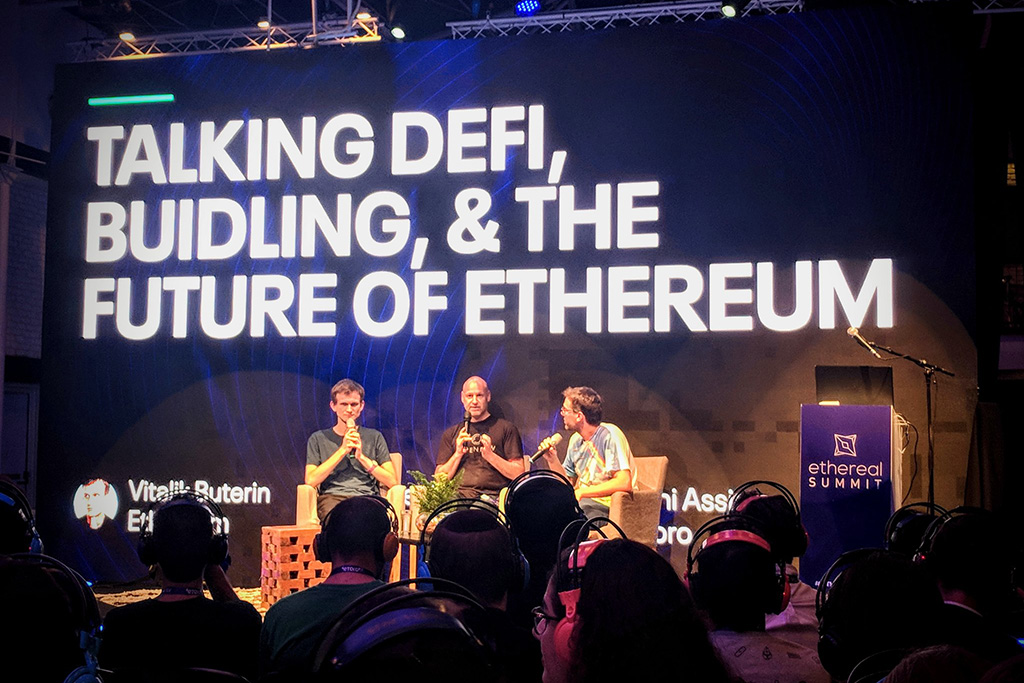Photo: Ethereal / TwitterOn Sunday, the Ethereal Summit took place in Tel Aviv. The Summit is a global series of conferences focused on connecting leading companies and influencers shaping the future of blockchain. At the event, Ethereum founders Joseph Lubin and Vitalik Buterin were among the speakers. They commented on the development of the upcoming Ethereum 2.0 update and discussed possible collaboration with Facebook within their nascent cryptocurrency – Libra.Prospects of Ethereum 2.0Ethereum 2.0 will facilitate a number of on-chain transactions while at the same time maintaining key aspects of decentralization and security. It combines important projects like Proof-of-Stake (PoS), sharding, and eWSAM. As Vitalik Buterin stated, the new network aims to run ‘tens of thousands of
Topics:
Daria Rud considers the following as important: Blockchain News, buterin, Companies, Cryptocurrencies, ETH, ethereal summit, Ethereum (ETH), ethereum 2.0, Events, Facebook, facebook libra project, joseph lubin, Libra, libra coin, libra project, libra regulation, News, Regulation, Vitalik Buterin
This could be interesting, too:
Bilal Hassan writes Morocco Cracks Down on Crypto Property Deals
Christian Mäder writes Binance and Global Fintech Institute Launch Initiative for Crypto Regulation and Compliance
Bilal Hassan writes Crypto Becomes a U.S. ‘Weapon,’ Says CryptoQuant CEO
Bilal Hassan writes White House Crypto Czar Sold Holdings After Trump Took Office

Photo: Ethereal / Twitter
On Sunday, the Ethereal Summit took place in Tel Aviv. The Summit is a global series of conferences focused on connecting leading companies and influencers shaping the future of blockchain. At the event, Ethereum founders Joseph Lubin and Vitalik Buterin were among the speakers. They commented on the development of the upcoming Ethereum 2.0 update and discussed possible collaboration with Facebook within their nascent cryptocurrency – Libra.
Prospects of Ethereum 2.0
Ethereum 2.0 will facilitate a number of on-chain transactions while at the same time maintaining key aspects of decentralization and security. It combines important projects like Proof-of-Stake (PoS), sharding, and eWSAM. As Vitalik Buterin stated, the new network aims to run ‘tens of thousands of transactions per second,’ and he is very confident about the launching phase of Ethereum 2.0 scheduled for January 3, 2020.
During the event in Tel Aviv, Buterin promised that the network will be interoperable with applications built on the original blockchain. Buterin said:
“[Ethereum 2.0] is an updated version of the same vision. It’s a sandbox where people can try things and see what works. The thing that has changed are the tools we use.”
According to Buterin, everything is ‘finalized except for things that come up during the security audits’. He added:
“The clients are now talking to each other. The next step is to make sure they can maintain a public network at scale. We’re talking about potentially hundreds of thousands of validators aggregating a huge number of transactions.”
Further, Ethereum co-founder replied to critics who believe that the rewards received on the Ethereum 2.0 network will be too low for validators to keep the network running. Buterin commented:
“There have been a lot of misconceptions there. There are people throwing around the 1 percent statistic. In reality, the maximum reward is 1.7 percent per year, only in the case where literally everyone is staking. In the case that a smaller number of validators are staking, the rewards go up a bit.”
Ethereum and Facebook May Collaborate
Vitalik Buterin also had an interview with Globes, where he shared his opinion about Libra – a stable currency designed by Facebook on a reliable and secure open-source blockchain, supported by a reserve of actual assets, and managed by an independent association.
First, Ethereum co-founder explained why he does not consider Libra’s current structure reliable in terms of privacy. According to Buterin, Libra does not have means for protecting the users’ privacy. Moreover, it does not provide enough scalability. Keep users’ currencies in custody wallets is also not the best idea. He added:
“In a situation like this, it’s always possible that a certain company will create a wallet that does not carry out such a process, and there may be people who will use it for money laundering.”
Moreover, Buterin considers such projects as Libra as ‘a wakeup call for governments’:
“In my opinion, projects like Libra are like a wakeup call for governments, which are now realizing that if they don’t revise the technology of their sovereign currency, they will have competition. We are therefore now seeing a lot of interest in creating a sovereign digital currency.”
At the same time, Buterin is generally positive about Facebook’s initiative. He believes that Ethereum and Facebook should work together. Buterin said:
“There’s definitely people looking at making a Libra Litecoin that runs on the Ethereum blockchain. I think we should extend an open hand to systems that are more decentralised than we would like.”
Ethereum co-founder and ConsenSys CEO Joseph Lubin supports such a view. During the Ethereal Summit, Lubin said:
“There’s definitely been some talks. There’s the possibility of interoperability with Ethereum if there’s a viable wallet connection. But I don’t see [Libra] being a viable competitor to Ethereum as a decentralized [financial system]. Actually, it could be an excellent onboarding mechanism for us.”
Libra is quite a controversial project and a number of governments set to ban any further development of Libra. But if Facebook one day partners with Ethereum to work on the improvement of Libra’s system, everything may change.
